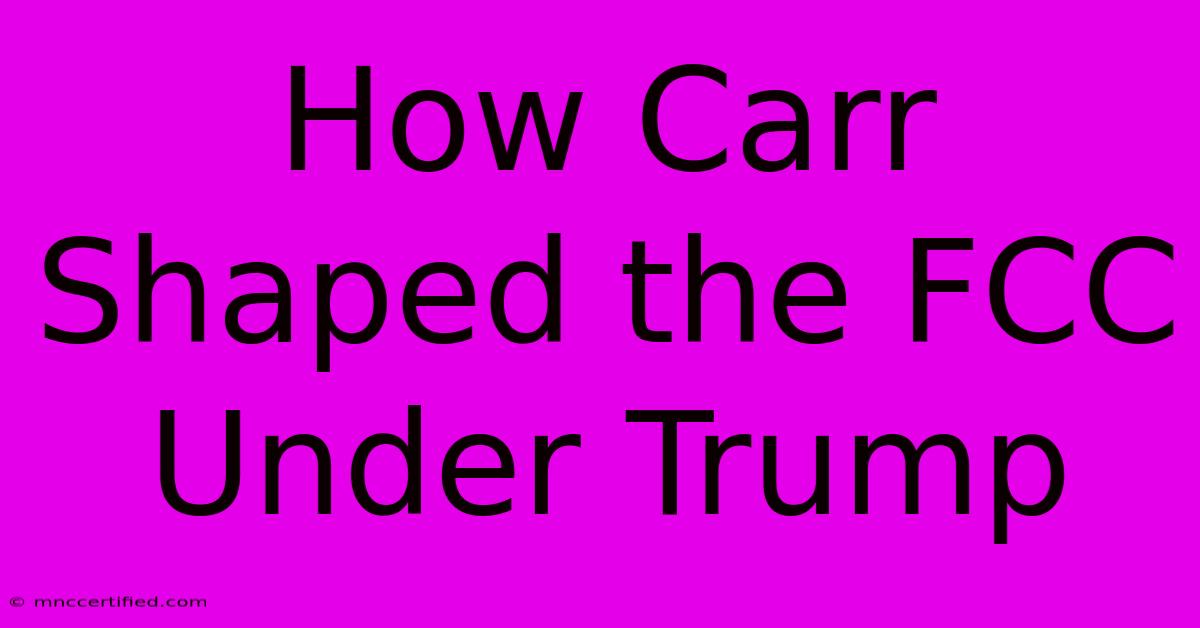How Carr Shaped The FCC Under Trump

Table of Contents
How Ajit Pai Shaped the FCC Under Trump: A Legacy of Deregulation
Ajit Pai's chairmanship of the Federal Communications Commission (FCC) under the Trump administration (2017-2020) left an indelible mark on US telecommunications policy. His tenure was characterized by a significant push for deregulation, impacting everything from net neutrality to media ownership rules. Understanding the scope of his influence requires examining key policy changes and their lasting consequences.
Net Neutrality Rollback: A Defining Moment
Perhaps Pai's most controversial action was the repeal of net neutrality regulations in 2017. This decision, widely criticized by consumer advocates and some industry players, essentially ended the principle of equal access to internet content, regardless of provider. Pai argued that the previous regulations stifled innovation and investment. However, opponents countered that the rollback paved the way for internet service providers (ISPs) to prioritize certain content, potentially creating a tiered internet system favoring those who could pay more. This remains a highly debated topic, with ongoing legal challenges and varying viewpoints on its long-term effects. Keywords: Ajit Pai, FCC, Net Neutrality, Deregulation, Trump Administration, Telecommunications Policy, ISPs.
Arguments For and Against the Repeal
Proponents of the repeal highlighted the potential for increased investment in infrastructure and faster internet speeds resulting from reduced regulatory burdens. They argued that the previous rules were overly complex and hindered competition. Conversely, opponents warned of the potential for ISPs to throttle access to competing services, create "fast lanes" for paying customers, and ultimately harm consumers. The debate continues to center on the balance between fostering innovation and protecting consumer interests. Keywords: Internet Access, Innovation, Competition, Consumer Protection, Infrastructure Investment.
Media Ownership Relaxation: Expanding Consolidation?
Pai's FCC also relaxed media ownership rules, allowing for greater consolidation within the broadcasting industry. Critics argued that this led to reduced diversity of voices and viewpoints, concentrating power in the hands of fewer corporations. Supporters, however, claimed that the changes reflected evolving media landscapes and fostered greater competition. This aspect of Pai's legacy raises important questions about the relationship between media ownership, diversity, and the public interest. Keywords: Media Ownership, Consolidation, Broadcasting, Diversity, Public Interest, Competition.
The Impact on Local News
One specific concern regarding the relaxed media ownership rules centers on their impact on local news. Consolidation could lead to fewer local news outlets, potentially impacting community information and accountability. This is an area that requires further study and monitoring to understand the full ramifications of Pai's policies. Keywords: Local News, Community News, Media Consolidation, Accountability.
Other Significant Policy Changes Under Pai
Beyond net neutrality and media ownership, Pai's FCC implemented numerous other policy changes, including:
- Easing regulations on the deployment of 5G technology: This aimed to accelerate the rollout of next-generation wireless networks.
- Streamlining the licensing process for various telecommunications services: This was intended to make it easier for companies to enter the market.
- Addressing the digital divide: While deregulation dominated his agenda, Pai also acknowledged the need to improve broadband access in underserved areas.
These actions, while presented as pro-business and pro-innovation, continue to generate debate regarding their broader societal implications.
Long-Term Effects and Ongoing Discussions
Ajit Pai's legacy at the FCC is complex and multifaceted. His actions, driven by a philosophy of deregulation, significantly altered the landscape of US telecommunications. While some argue his policies stimulated innovation and investment, others maintain they negatively impacted consumers and reduced competition. The long-term effects of his decisions continue to unfold, prompting ongoing discussions about the appropriate balance between regulatory oversight and market forces in the digital age. Keywords: Regulatory Oversight, Market Forces, Digital Age, Telecommunications Regulation.
This article provides a comprehensive overview of Ajit Pai's tenure at the FCC, utilizing targeted keywords to enhance its SEO performance and offering a balanced perspective on the complexities of his legacy. Remember to build backlinks from reputable sources to further boost its ranking.

Thank you for visiting our website wich cover about How Carr Shaped The FCC Under Trump. We hope the information provided has been useful to you. Feel free to contact us if you have any questions or need further assistance. See you next time and dont miss to bookmark.
Featured Posts
-
Dune Prophecy Episode 1 Hidden Details
Nov 19, 2024
-
Thanksgiving Trip 80 Million Expected Travelers
Nov 19, 2024
-
What Is Insurance Services Office
Nov 19, 2024
-
Sidemens Wembley Charity Match Sells Out
Nov 19, 2024
-
Art Gallery Insurance Application
Nov 19, 2024